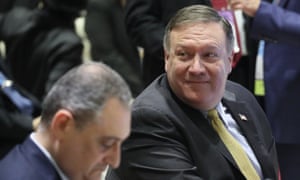Pyongyang appears to be evading curbs with help of lax approach by China and Russia

Without the spectre of imminent nuclear war, there is not much appetite for strict enforcement of international sanctions aimed at forcing North Korea to abandon its nuclear weapons and missile programmes.
There is a mounting body of evidence that Pyongyang is evading the restrictions with a combination of subterfuge and lax enforcement by China and Russia, its closest allies, rendering the US plan of maximum pressure increasingly ineffective.
In two high-profile and historic meetings this year, the North Korean leader, Kim Jong-un, agreed to complete denuclearisation of the Korean peninsula, but has done little to curb weapons development. The US has demanded Kim give up his nukes before any sanctions are lifted.
North Korea has used a variety of means to sidestep the restrictions. Ship-to-ship transfers of oil and coal in the dead of night have been repeatedly documented, North Korean labourers work openly in China and Russia, and Pyongyang continues to work with Syrias military.
Kim Jong-un is playing a very logical game. Hes getting weaker sanctions enforcement from China and Russia while engaging the United States on his terms, said Mintaro Oba, a former US diplomat who worked on North Korea policy.
If its possible to weaken the resolve of China and other members of the international community to impose and enforce sanctions, thats certainly in North Koreas interest. But North Korea isnt so committed to that goal that it would give up its nuclear programme.
Kim has made three trips to China since March the initial visit was the first time he had left North Korea since coming to power in 2011. China is by far the Norths closest ally and the country accounts for more than 90% of North Koreas total trade volume. Beijing has consistently backed Pyongyang in an effort to ensure the regimes stability, hoping it can act as a buffer to the US ally South Korea.
More than 10,000 North Korean workers have registered to work in Russia since September, with at least 700 obtaining work permits this year, in potential violation of UN sanctions, the Wall Street Journal reported last week. US officials estimate North Koreans working in Russia send as much as $300m (230m) a year to Pyongyang, a critical source of foreign currency.
In a sign of growing frustration, Mike Pompeo, the US secretary of state, publicly warned Russia and China last week against weakening sanctions enforcement during a trip to Singapore.
His plea came as a panel of UN experts tasked with monitoring sanctions implementations said Pyongyang had continued its nuclear and missiles programmes, and documented a host of violations including attempts to sell weapons to armed groups in Yemen and exporting more than $100m in textiles over a six-month period.

North Korea has not stopped its nuclear and missile programmes and continued to defy security council resolutions through a massive increase in illicit ship-to-ship transfers of petroleum products, as well as through transfers of coal at sea during 2018, the report said, according to a Reuters report.
North Korean coal has even turned up at South Korean ports, which has long had a ban on products from the North.
Amid the growing list of apparent sanctions violations, North Koreas state-controlled media has begun calling for the US to drop the restrictions, saying its moratorium on missile and nuclear tests, the dismantling of its only known nuclear test site and the return of Korean war dead was enough.
There have been outrageous arguments coming out of the US state department that it wont ease sanctions until a denuclearisation is completed, and reinforcing sanctions is a way to raise its negotiating power, the Rodong Sinmun newspaper, a ruling Workers party mouthpiece, said in a front-page editorial. How could the sanctions, which were a stick the US administration had brandished as part of its hostile policy against us, promote the two countries amity?
Several other North Korean outlets also criticised the pressure campaign as anachronistic and an obstacle to better relations. The complaints may be a sign sanctions are still a significant hurdle to trade or could merely be a negotiating tactic.
The current state of weakened sanctions is arguably the most tangible product of [Kims] foreign policy ventures, saidVan Jackson a former policy adviser to the US secretary of defence.
Maximum pressure has lost all steam, added Jackson, now a senior lecturer at Victoria University of Wellington. One of the perverse consequences of the nuclear crisis last year was that nobody wanted a return to that precarious situation, and virtually everyone was willing to accept any outcome that assured we didnt return to the brink of a nuclear war.
Read more: http://www.theguardian.com/us


